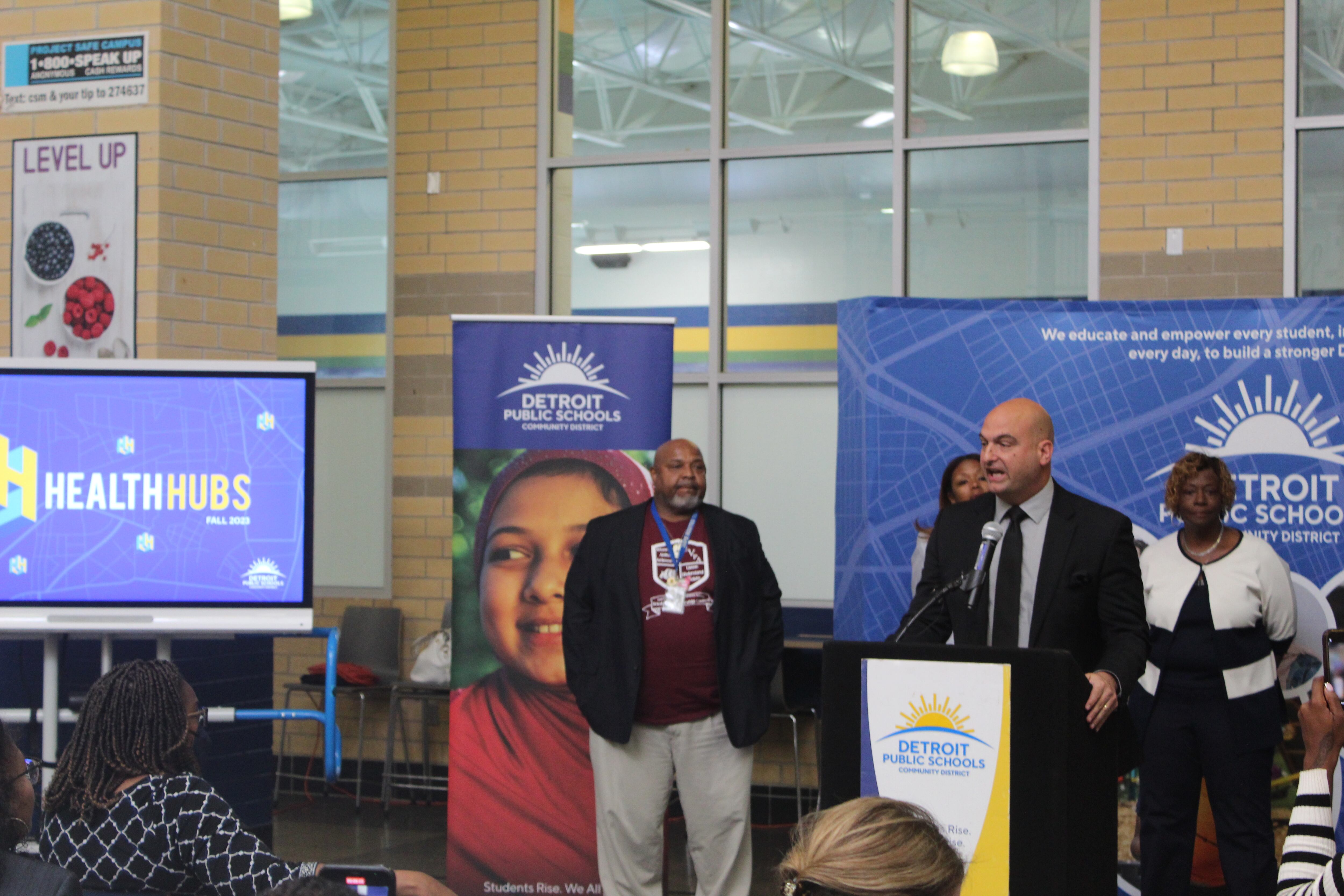Editor’s note: This story was updated Tuesday, August 8 to disclose the Kellogg and Kresge foundations as financial sponsors of Chalkbeat.
Three regional foundations will help fund the Detroit school district’s new series of school-based health hubs, designed to provide students and families with timely and convenient access to medical services.
W.K. Kellogg Foundation, Kresge Foundation, and Children’s Foundation will provide the Detroit Public Schools Community District with a combined $1.8 million to develop 12 health hubs in neighborhood schools across the city, district officials announced Monday at a news conference at Detroit’s East English Village Preparatory Academy at Finney. (The Kellogg and Kresge foundations are supporters of Chalkbeat.)
The newly announced donations are in addition to the $2.76 million already earmarked from the Ballmer Group. Earlier this month, DPSCD Superintendent Nikolai Vitti announced at a community meeting on mental health and school safety that the health hubs would begin in the 2023-24 school year.
In addition to East English Village Preparatory Academy at Finney, the first health hubs will be launched at Southeastern High School, Osborn High School, Central High School/Durfee Elementary-Middle School, and Western International High School/Maybury Elementary School.
The remaining hubs will be launched in the next two school years.
At Monday’s news conference, Vitti heralded the health hubs as an “innovation” that will help the district in addressing chronic absenteeism, in which students have missed 10% of the school year, or 18 days.
In the 2021-22 school year, DPSCD recorded a 77% rate of chronic absenteeism, up from 63% before the pandemic, largely stemming from COVID quarantine and close-contact guidance the district observed that year. The district’s rate dropped to 68% this past school year; a positive direction, Vitti said, but still short of the district’s goal.
The health hubs, he added, will provide students and families within a three-mile radius of the site direct access to physical, mental, and dental health services that might otherwise impact a student’s attendance record.
“We had to move to a place of problem-solving, we can’t just accept these numbers,” Vitti said. “
“We believe resources can be provided best, most efficiently, with less bureaucracy, with less red tape in our schools because that’s where our children are at, and often that’s where our families are most comfortable.
“Our data is very clear: when students are absent less than nine times throughout the school year, they’re anywhere from three to five times more likely to be at grade-level performance in reading and math or to be college ready at the high school level.”
Andrew Stein, president of the Children’s Foundation, echoed the superintendent’s remarks.
“We know firsthand the need for the holistic suite of supports that the health hubs are providing,” Stein said. “And in particular, the critical role that a school nurse plays in really any school-based health strategy. The data is clear on the role nurses play in attending the physical and emotional health of students.”
The Children’s Foundation’s investment will support the creation of the health hub at Central High School, as well as funding school nurses at Central and four other DPSCD schools.
The Kresge donation will help fund the 12 health hubs, as well as establish a health hub at the School of Marygrove. Meanwhile, the W.K. Kellogg Foundation will support oral health services at all the health hubs and launch a districtwide oral health clinic in northwest Detroit.
The first five school health hubs will be phased into buildings during the school year. Each site will have a designated full-time coordinator who will assist students, families, and community members with accessing services. The hubs also will partner with local health care providers Ascension, Henry Ford Health, and the Institute for Population Health to staff the physical and behavioral health services at each location.
The coordinator will also work in tandem with school-based or districtwide attendance agents, to refer students and families to the health hub after phone calls home determine what barriers are preventing a student from coming to school.
Ethan Bakuli is a reporter for Chalkbeat Detroit covering Detroit Public Schools Community District. Contact Ethan at ebakuli@chalkbeat.org.







